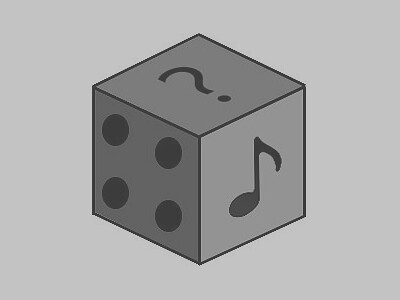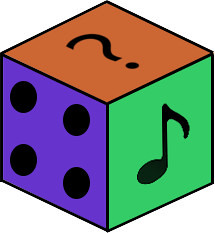
- Accompanist (role)
- Ad libitum
- Agenda
- Aleatoricism
- Aspect
- Balance
- Bartle types
- BCG
- (Cognitive) flow
- Conductor (role)
- Constellation
- Constructor (role)
- Co-optionality
- Cue cards
- Dice
- Dimension
- Downbeat
- Downtime
- Elegant Game
- Emergence
- End Condition
- Event (musical event)
- Extended technique
- Facilitator
- Fighting
- Flow
- Found sound
- Gameplay flow
- Genre
- Heteronomous Music
- Horizon of intent
- Improvisation rite
- Insert game
- Inspire cards
- Instrument Preparation
- Judge (role)
- Karaoke
- King-making
- Learning curve
- Ludomusical dissonance
- Meaningful Choice
- Mechanic
- Music game
- Non-idiomatic music
- Notation Cards
- Open work
- Parameter
- Pervasive Game
- Player (role)
- Prompter (role)
- Psychographics
- Quarterbacking
- Rhythm cards
- Rhythm game
- Roles
- RPG
- Rule Cards
- Speedrun
- Stacking
- Trading
- Transition
- Upgrade
- Victory condition
- Xenochrony
- XP
- Yes, and...
"Anything" that can happen — (in our case) a unit of music at any given scale of consideration.
Usage
In most situations event can be interchanged with the idea of ‘anything’. For our contexts it is a great term to emphasize endless possibilities in music; it has also a broader understanding in the field of performance and conceptual art, so please mind the context of usage.
But in a musical context, for example instead of saying “Play a solo” in a section of a song, you might say “Play an event.” A solo is a defined term that comes with expectations (e.g. one featured instrument plays melodically in the foreground). However, an event is giving the player the choice to do whatever they want. If you make decisions on music (e.g. in a game, or when making a game) and absolutely want a solo, in the conventional sense, you will indicate that clearly by stating to the player to play a solo. If you want to give the player complete freedom, and at the same time emphasize that freedom, it might be a good idea to instruct an event. If the player chooses, they can still play a conventional solo. The choice is there.
The distinction is an important one in that it opens up more creative possibilities and freedom to the player/composer. It should be stressed that events literally mean anything. Of any length. An event can be anything from a riff, a chord, an atmosphere, a bass line, a whole song, a tempo, wild sound effects, a dance, cook a meal, play a game, build a house, nothing, anything!
Events can be used in many areas of creating music. From improvisation, to composition, to playing music games.
If we were to perceive a song in the form of events we can analyze it on three levels:
- Micro-level Events = scale / riff / a chord / singer / keyboard / an old mic / tempo / ect.
- Meso-level Events = key / a chord sequence / melody / entire instrumentation / folk style / arrangement / ect.
- Macro-level Events = whole song / performance / performance space / ect.
Video
Introduction to Events
Games using Events explicitly
Both the pop song and a symphony can be perceived as being made up of events of different levels of analysis. Each game also always consists of events, but our events tag is used for those that directly describe some non-conventional events for players to perform.
- Trigger Cards
- Fluxfestkit Legacy
- Evolution of music
- Dice Contract
- Travel Routes
- Textmusic 3
- Mutual Prescriptions series
- Event Lists Game Template
- Diced Events
If you think anything should be added to this subpage, please drop a hint or a link for future editors.
